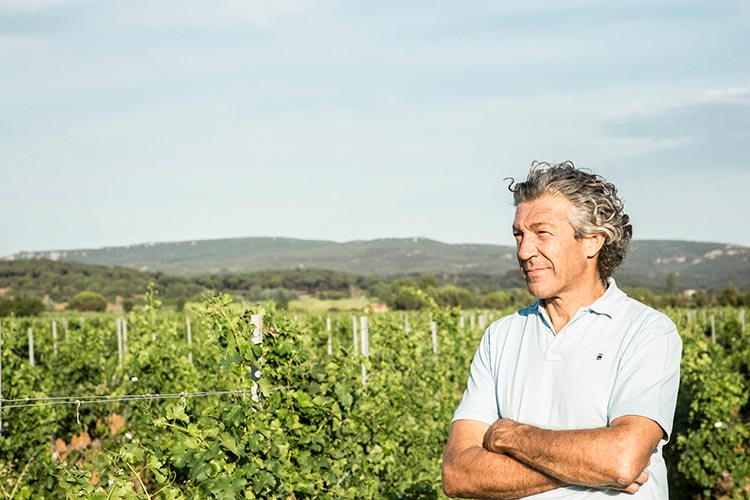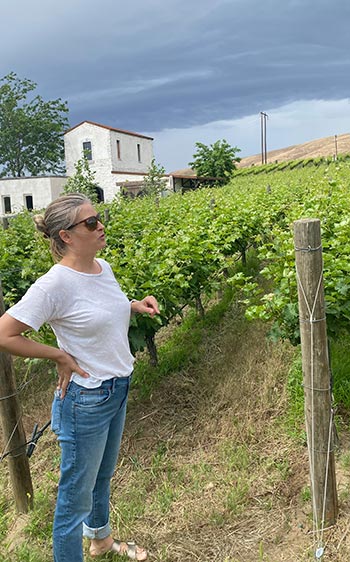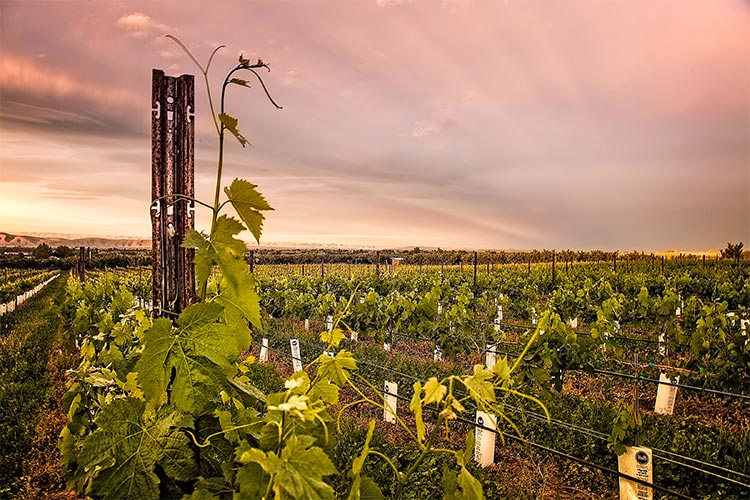With few biodynamic wineries in the state, will younger buyers help shift the balance?

Written by L.M. Archer
In 2022, French biodynamic winemaker Gérard Bertrand stopped in Seattle to promote his bestselling book Nature at Heart. The former soccer star and international biodynamic authority chose Washington State for a reason.
“When I had the idea to tour in the United States for the launch of my new book, I knew I wanted to stop in Seattle,” says Bertrand. “First, because Washington is historically one of the most organic-friendly states in the USA, according to the Organic Trade Organization. Second, because Seattle is located in one of the top wine-producing regions in the U.S.”
Following Nature’s Rhythms
Currently, three of Washington’s approximate 1,000 wineries hold Demeter Certified Biodynamic® certification: Hedges Family Estate and Domaine Magdalena, both on Red Mountain, and Wilridge Winery in Naches Heights in Yakima.
Simply put, biodynamic certification draws from the agricultural teachings of the 19th century Austrian philosopher Rudolf Steiner. He developed the system as a remedy for post-war farmers suffering from dying soils caused by commercial fertilizers and pesticides.
As an antidote, biodynamics promote healthy soil through natural remedies. These include sprays, or ‘teas,’ made from herbs, minerals, and composts, then applied following celestial rhythms. Rather than commercial monocultures, biodynamics also promotes biodiversity, and considers the entire farm a complete, interdependent organism. Vineyards and wineries practicing biodynamics fall under this ‘farm’ umbrella.
“One of the keys to biodynamics is that the farmer is considered part of the farm,” says Paul Beveridge, attorney and owner of Wilridge Winery, Washington’s first certified biodynamic and organic winery, distillery, and vineyard. “The farm is a complete organism, where there are no outside inputs. Everything is returned to the farm via composting and livestock, and the farmer is sort of the brain of the organism.”
Beveridge points out that eastern Washington lacks rain and common disease pressures, proving the ideal environment for organic and biodynamic farming. Yet few farmers practice them. “It’s just a lot easier to spray herbicides and pesticides than it is to grow biodynamically,” Beveridge says. “It’s also a lot less expensive.”
Social Imperative
Biodynamic also offers a social imperative. “My kids and other people’s children are hiking and going through that vineyard every day,” says Beveridge, whose winery abuts a nature reserve on three sides. “So we don’t want to be spraying a bunch of crap.”

Maggie Hedges, co-proprietor of Domaine Magdalena, concurs. She and husband Christophe Hedges of Hedges Family Estate moved onto Domaine Magdalena’s vineyard and estate after marrying in 2004. “We raise the kids here, and we have mouse cats and the dogs. So this is my yard,” she says. “We’ve been farming 100% organically from the beginning. It became very clear once we started living here we need to take it further.”
As a result, she piggybacked onto the Hedges Family Estate’s biodynamic program; both earned certification in 2011. Given her small size (four acres), Maggie Hedges hires out vineyard labor to weed, spray, and manually apply locally sourced steer manure. To fix nitrogen soil issues, she planted locust trees along her estate roadway. And to fight bad bugs, she cleverly employs drones to drop ‘good’ lacewing bugs among the vines.
Differing Mindsets
Both Hedges and Beveridge admit that differing mindsets may impede biodynamics among Washington winemakers. Beveridge notes a disconnect between Eastern Washington growers and the Seattle and Portland metro markets. “Growers out there don’t see how important environmental and sustainable and biodynamics are to people in the market.”
Hedges acknowledges Eastern Washington’s long agricultural history. “We are heavy in agriculture; we’ve been feeding half the country for 100 years,” she says. “So a lot of people that have wine grape vineyards started out with juice grapes, or apple orchards. There is still a lot of that mentality about big, big vineyards.”
Consequently, many growers consider grapes a commodity. “This is not a commodity business for me,” Hedges says. “So if my yield goes down, in some years, when things are more difficult, I make less wine. Which is a much different approach than especially the bigger folks.”
Christophe Hedges contends that biodynamics best suits small vineyards. “You’re not going to see it with big vineyards,” he says. “It’s not practical. Biodynamics was never set up for things over 500 acres. It doesn’t work. I mean, the concept is to have biodynamic vineyards and farms that are small, and not corporatized.”
Beveridge agrees. “It’s intensive, paying attention to the needs of the plants that you don’t see in a big industrial place, where they’re just driving a sprayer through miles and miles of grapevines,” he says. “[Here], each plant is handled individually, the needs of everything monitored closely, and you’re not doing anything evil.”
Will more winemakers follow suit? Maggie Hedges remains pragmatic. “Do I see a bigger explosion of biodynamic farming coming in Washington?” asks Hedges. “Unlikely. Maybe more, but definitely the younger wine buyers love that kind of thing, because they care about where their food comes from, and how it’s handled. And so the more those people come into the market, yes.
“The goal for me of biodynamics is to make sure that we’re doing our best to create a living ecosystem,” she concludes. “And to try to keep it in balance as much as possible. And that’s challenging.”

In 2022, the Washington State Wine Commission launched Sustainable WA, the first statewide sustainability certification program. “Most people understand ‘sustainable’ to be about environmental impact only,” says Patrick Rawn, winemaker at Two Mountain Winery and Sustainable WA board member. “They are very interested to learn the standard also goes so deep into human resources and community, as well as healthy business practices.”
Working Toward A Healthier Tomorrow
Ultimately, Sustainable WA promises a healthier future for Washington. “It is a flexible program,” says Maggie Hedges. “They will work with people who already have certifications. For people who don’t have certifications, but want to work towards something, there are small things that they can do. I really love that approach.”
